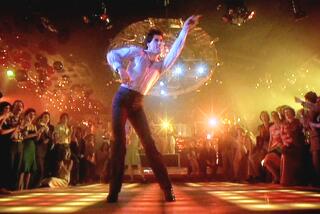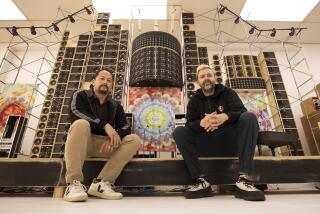‘Eventually, it took up the whole house. There were record boxes in the bedrooms, in the kitchen . . .’
- Share via
A community’s nagging ills can bring forth unexpected heroes, as has just been shown in the case of Silver Lake’s notorious nightspot, Cache.
The dance club on Glendale Boulevard closed earlier this year following a decade of decline marked by bankruptcy and a lot of neighborhood Angst.
For many years, when it was the Thistle Inn, the restaurant had been a community and commuter gathering spot of good reputation. After its owner died early in the 1980s, a group of hundreds of small investors came forward to open Cache, which became a popular Latino nightclub.
But Cache went bankrupt and was placed in the hands of a receiver who discovered that the establishment had no dance license. He applied for one, only to encounter an outburst of protest from neighbors over the noise, traffic and crime, which they believed was being caused by Cache.
The Los Angeles Board of Zoning Appeals turned down the application. Cache was put up for sale.
Long before any of that began, back in the 1970s, a hole-in-the-wall store called Rainbow Records opened in a shopping center a few blocks down the road, sandwiched between a Savon Drug Store and a Kentucky Fried Chicken.
In those unhip environs, Rainbow Records’ manager and part owner, Marty Levy, hung out in tie-dyed shirts, grooved on loud music, made friends with customers young and old and altogether presented an endearing model for how an unrepentant flower child with a receding hairline could work with the system.
In the meantime, two brothers from Brea, Wayne and Gary Johnson, were working their way up in the rare record business.
“It was more of a hobby in those days,” said Wayne Johnson, who was an electronics technician in his early 20s then. “We started out going to garage sales and swap meets. My brother and I are music lovers.”
A swap meet at Capitol Records, at which records were selling for $50 and $100, converted them to real collectors.
A real collector, Johnson said, buys records he doesn’t intend to play, such as an original Beatles 45, a mint copy of which could cost $8,000.
“Nobody could play that,” Johnson said.
They soon discovered they had a knack for finding records that were too good to play. They began buying, selling and hoarding.
“It just kept getting bigger and bigger,” Johnson said. “Eventually, it took up the whole house. There were record boxes in the bedrooms, in the kitchen, in the closet. We hired our first employee.”
Their mail-order business spread around the world.
“We learned very quickly,” Johnson said.
One thing they learned was that to get some of the rare collectibles they wanted they had to buy large collections of mostly common records. They would need a retail outlet for their cheaper records.
In 1982, they bought Rainbow Records. They renamed it Rockaway but kept Levy as manager and resident jazz expert.
“Now that we had the retail store, we had the ability to pay a decent price on common records,” Johnson said. “We had no idea what the market was.”
It was so good that within a year, Rockaway outgrew the 700-square-foot store. It moved a few doors over to a vacant dry cleaner with almost four times the space. When they lost their lease on that, Johnson decided it was time to buy.
The two prime spots--Melrose Avenue and Ventura Boulevard--were ruled out as too expensive.
Besides, Wayne Johnson, who runs the business while his brother Gary sticks to buying records, had moved to Eagle Rock.
“I can’t stand commuting,” he said.
Up the street they found what they needed in a seedy-looking bar called The Mixer, just across the street from Cache. It had been closed three years.
They refinished it in bold yellow and black tile and opened April 29 last year to fanfare and praise from public officials for their good community work. The new home was only briefly adequate for an operation employing 40 people.
“We outgrew it before we moved in,” Johnson said. He now shares a cubicle of an office with a Beach Boys surfboard, a collector’s item that he does not intend to take to the surf.
The racks in their store are now mostly crammed with used CDs, which have become their biggest item. Aisles are lined with LPs stashed in cardboard boxes. In the back, the mail business has been trimmed to only the Beatles. A third brother handles the rest of it at the Johnsons’ new store in Mesa, Ariz.
Next, the Johnsons bought a property next door, a duplex that was notorious for its overcrowding and late-night traffic. They tore it down to expand the store.
Then Cache went on the market. It was just what the Johnsons needed to bring their two warehouses and retail store together. They bought it for just under $1 million. Johnson is aiming for an opening in January and is looking for a restaurant to take over The Mixer.
If it all works, that would be two bars and a flophouse wiped out in just two years.
Not a bad piece of work for a bunch of guys who live for music.
More to Read
Sign up for Essential California
The most important California stories and recommendations in your inbox every morning.
You may occasionally receive promotional content from the Los Angeles Times.











